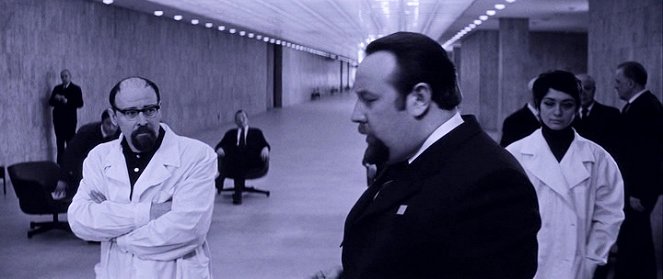Directed by:
Andrei Arsenyevich TarkovskyScreenplay:
Andrei Arsenyevich TarkovskyCinematography:
Vadim YusovComposer:
Eduard ArtemyevCast:
Nataliya Bondarchuk, Донатас Банионис, Jüri Järvet, Anatoly Solonitsyn, Nikolay Grinko, Vladislav Dvorzhetsky, Raimundas Banionis, Bagrat Oganesyan (more)Plots(1)
Solaris is a love story rich with emotion and mystery, set within a science fiction framework. The story, which takes place sometime in the future, opens as Dr. Chris Kelvin is asked to investigate the unexplained behaviour of a small group of scientists aboard the space station Prometheus, who have cut off all communication with Earth. Elvin undertakes the journey after watching a communiqu from his close friend Gibarian, the missions commander, who seeks Kelvins help abroad the Prometheus for reasons Gibarian is unwilling or unable to explain. Keenly aware that his opinion will decide the fate of the orbital station, Kelvin is shocked by what he finds upon his arrival. Gibarian has committed suicide and the two remaining scientists are exhibiting signs of extreme stress and paranoia, seemingly caused by the results of their examination of the planet Solaris. Kelvin, too, becomes entrapped in the unique worlds mysteries. Solaris, somehow, presents him with a second chance at love to change the course of a past relationship that has caused him overwhelming guilt and remorse. But can he really revisit and alter the past? Or is he fated to repeat its mistakes? Solaris is a visually hypnotic, deep affecting story of conscience, love and reconciliation. (Shock Entertainment)
(more)Reviews (8)
Technically brilliant and incredibly profound. Sometimes even unattainable. Andrei Tarkovsky is very demanding on the viewer with his abstraction and does not take it easy on them even for a second with his long-winded visions in his realm of philosophy. However, all inaccessibility is beautifully erased by the simple central theme of conflict between the most desperate emotions and the cold, meaningless scientific research. Most importantly, I guarantee that if you let yourself get absorbed, you won't be able to get the majority of the scenes out of your head due to their ambiguity.
()
Equally difficult to grasp as "2001: A Space Odyssey," but equally interpretive, possibly even stronger. Tarkovsky's film does not rely on visual spectacle, but instead the Russian creator opted for philosophical sci-fi, where everything important unfolds through dialogue, memories, not necessarily through images. There are scenes from inside spaceships, but it remains very limited. Even so, this is how sci-fi can be filmed, mainly because the narrative is no less powerful.
()
8/10/2009: 2 stars /// 7/11/2014: I’m several years older and more experienced as a viewer, so I thought I’d give it another go, and it’s quite good. Science fiction of the more intellectual kind, mainly for people who enjoy being offered something to ponder over. The atmosphere is engaging and unsettling, also quite thought-provoking at times. But only at times, really, because, even though this is philosophic sci-fi, there’s not that much philosophising (they hardly speak). It could also be shorter, a lot.
()
A non-commercial, artistic sci-fi masterpiece that doesn't have that much to say compared to the brilliant Stalker, but it remains more than pleasant to watch after all these years. Unfortunately, I don't like it much when I'm sucked into a whirlpool of dense atmosphere, timeless motifs and tiresome philosophising for three hours, only to not understand the final twist at all and not be able to put all the beautiful pieces of the complex puzzle together into an even more impressive whole. Maybe one day the Holy Spirit will shine on me and I will be able to appreciate this formally perfect film as it surely deserves, but in a normal state of mind, that's not in sight. 70%
()
The Tarkovsky scarecrow may not be such a major problem if we view Solaris through the lens of contemporary science fiction. The result will, unfortunately (or thankfully), be just another film that has not withstood the ravages of time. Of course, you can also read Lem's novel, watch the modern remake and, with a slightly ironic smile, look for the old TV version. All science fiction before Star Wars has its limits, including Tarkovsky's opus. I really don't appreciate a spaceship whose integral part is the icons of Andrei Rublev spread out in the cabins. I really, really don’t.
()
Gallery (40)
Photo © Mosfilm


Ads